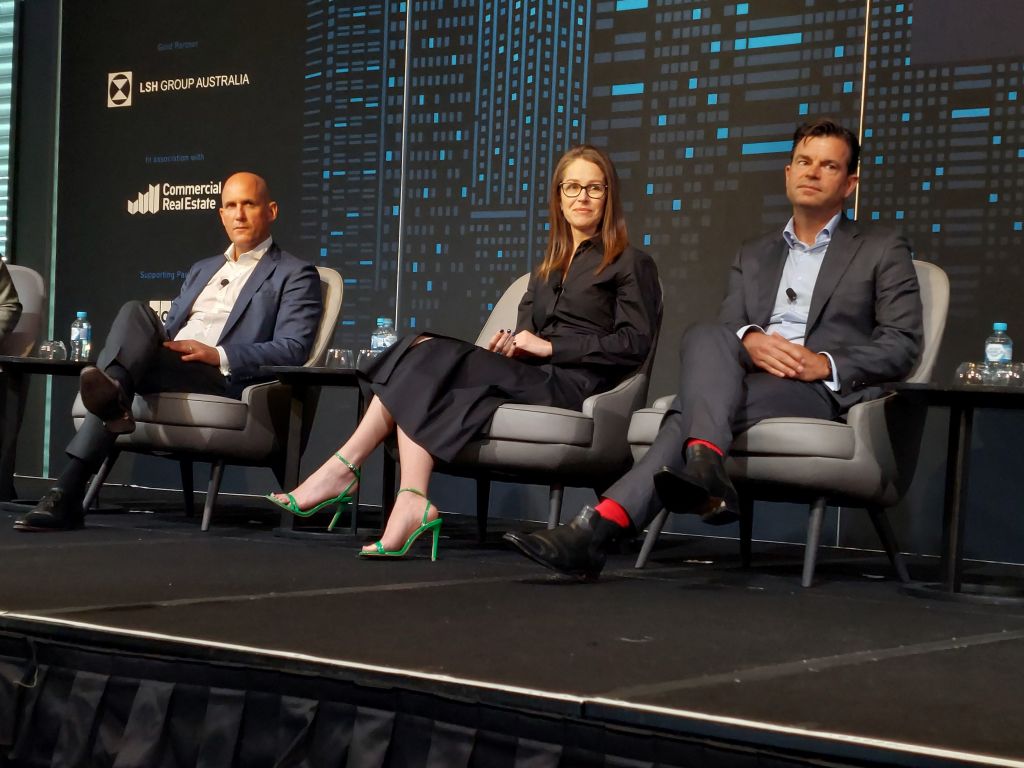While the future of the workplace is still very much a moving target, CBRE Australia and New Zealand CEO Phil Rowland wants to make one thing clear: Hybrid working does not mean the death of the office.
In fact, all the signs are that it’s triggering a resurgence of demand for higher quality in office space and could well even lead to an increased demand for floor area.
“Most organisations are acknowledging flexible working is here to stay and there’s a real acceptance of different work settings, which is a really important shift that’s taken place,” said Rowland, one of the key speakers at the AFR Property Summit on Monday.
“But we’re also seeing the amount of time that organisations are expecting their people to work in a non-office environment reducing, from three or four days to an average of 1.7 days out of the office. But that it’s not a one-size-fits-all situation, and hybrid working is by no means the death of the office.”
Rowland, who appeared on a panel to discuss the big shifts changing the face of commercial property, said the kind of offices now in the most demand were those designed to much more closely suit the profiles of diverse work activities.
“Those offices newly built or under construction that are well designed and well located in precincts that enable people to live, work and play are becoming really, really important offerings in the market and are being taken up strongly by occupiers,” he said.
“In the war for talent, this flight to quality is increasingly important.”
Another member of the panel, Alison Mirams, CEO of construction firm Roberts Co, said this meant more collaboration spaces in place of the old activity-based working where people shared workspaces.
“I’m not sure people want to share desks any more,” she said. “They are acutely aware of cleanliness and I hope we don’t go back to that way of working.
“During COVID, flexibility also became important and it was suddenly no longer a woman’s issue; it became a people issue. That push to flexibility has been incredible.”
The third member of the panel, Jonathan Hannam, co-founder and managing partner of Taronga Ventures, said suddenly the different ways of working meant companies were keen to invest in technology, whereas before they couldn’t see the value of such a proposition.
Innovations in proptech then made it much easier for companies to allow their employees to work flexibly. “And that doesn’t just mean flexibility in a binary way between office and home,” said Hannam. “It gave people much more choice in their environments and where and when they wanted to work …
“But a lot of people aren’t sure about the idea of going back to the office for five days a week, and they’re thinking that now maybe they don’t want to work for an organisation that insists on that. The idea is to curate spaces that make the precincts more alive and so they’re happy to come in.”
Yet there’s a wide spectrum of demands on workers now, from the big US investment banks wanting staff back in the office for most of the week, to tech companies putting in few rules.
Those companies with high levels of trust in their workers are tending to empower them more and aim for outcomes rather than processes. For those less adaptable, it means they’re struggling more with the new hybrid working. At the same time, however, Rowland reports there’s been little reduction in the demand for office space.
Those businesses that traditionally take below 1500 square metres are showing little sign of reducing the space they want to lease, while the bigger users of space are yet to decide on their volumes.
“We’re not seeing a dramatic drop-off in the amount being taken up,” Rowland said. “It’s more about how the space is being designed and what it’s being used for. It’s being organised in a way to give people more freedom and choice in the workplace, with collaborative spaces so people can come together and support each other.
“A lot of landlords are also providing the kind of spaces that can flex up for peak periods, or down for quiet times, and maybe expand for special events. Flexibility is now the order of the day.”
